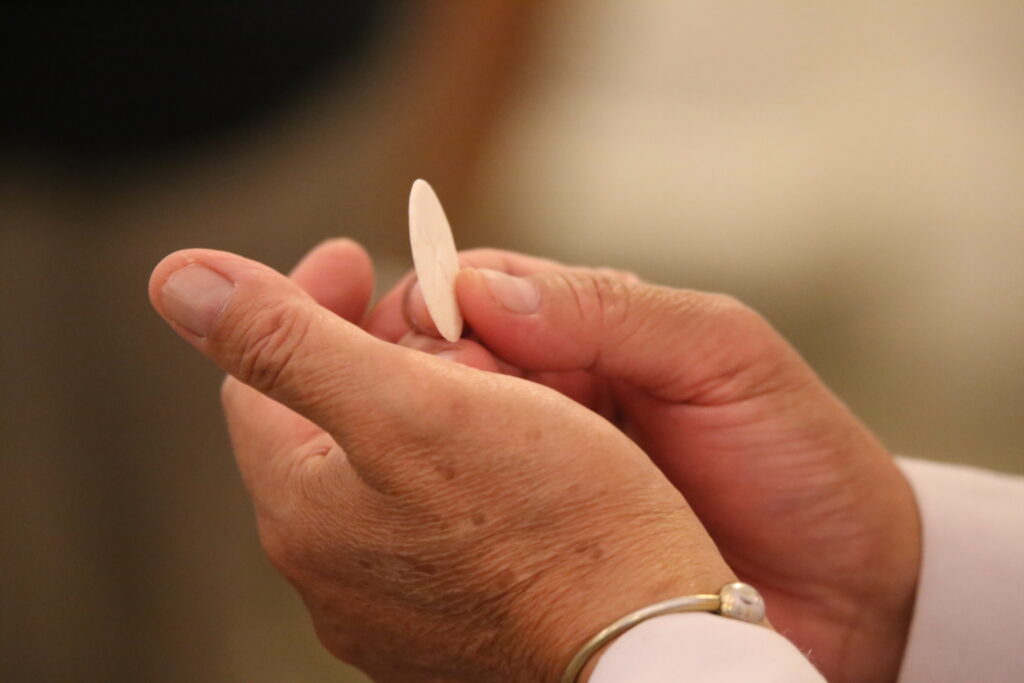Question:
I am struggling with obedience. My father was Protestant (Bible Belt southern), and my mother was Catholic. I was encouraged to study and was allowed to choose my own church. Now, for the first time in 60 years, I am disagreeing with the Catholic Church and not sure how to approach it.
I feel that the Church has established a terrible precedent by allowing religion to be deemed nonessential during the COVID crisis. Not to provide holy Communion at Easter, when missing Communion at that time was considered a grave sin, was shocking. In my parish, we had no services at all for the first two weeks. Then Mass was livestreamed for the next two months. That was followed by two weeks when Mass could be attended alphabetically (A-M one week, N-Z the next).
I have lost so many during this time — a niece, four cousins, several friends. Four of these died alone in the hospital — no family, no extreme unction. Six have not had funerals. With religion taking a hands-off approach, the fabric of our society is shredded. Right when we needed our Church, it disappeared. I feel that obeying my Church right now is a disobedience to God’s clear requirements. I can’t talk to my friends, as they feel that watching Mass on television in a nightgown is the same as “attending.” What do I do? (Courtland)
Answer:
To a certain extent, I understand what you are saying and sympathize. (A neighbor of mine asked recently, “How is it that liquor stores in our region were deemed essential but churches were not?”) It’s a bit difficult, though, to respond to your list of concerns because situations vary widely from place to place.
In some areas, the decision to close a church came from the diocese or parish, but in other places it was mandated by government entities. At the height of the pandemic, the Church was well-advised to suspend Masses and other services. Now, thank God (I write this in early August 2020), parishioners in most of the United States are beginning to gather for worship once more.
A couple of your observations deserve particular comment: First, not receiving holy Communion during the Easter time could not possibly be sinful if there were no opportunity to do so.
Secondly, I’m a little surprised that your friends think that watching Mass on television is the same as attending. By contrast, several people have mentioned to me how much they have missed parish Masses and the chance to receive the Lord in Communion.
Finally, the Church hasn’t taken a “hands-off approach” at all; in fact, many parishes have made diligent efforts throughout the pandemic to maintain contact with parishioners through videotaped Masses and phone calls to each of their parishioners.
Question:
In one of your recent columns — about Our Blessed Mother’s Assumption — you wrote “Some theologians feel that, since death is a consequence of sin, Mary would not have had to die.” I have never thought of sin as causing death. Can you explain this a little more? (Montvale)
Answer:
At the dawn of creation, the very first human beings were made to live forever and that was the divine intention and desire. The sin of Adam and Eve, however, changed that, and the whole of human history was altered by the fault committed by our first parents.
This is reflected in the teaching of the Catechism of the Catholic Church: Because of original sin, harmony with nature is broken and “creation is now subject ‘to its bondage to decay.’ … The consequence explicitly foretold for this disobedience will come true: Man will ‘return to the ground,’ for out of it he was taken. Death makes its entrance into human history” (No. 400).
Question:
A few months back, you answered a question about whether to stand or kneel when receiving Communion. You said the decision is left to national conferences of bishops and that in the United States, the suggested posture is standing, although those who prefer to kneel may do so. You added that your own pastoral inclination is to say, “Why should it matter?”
Well, my view is that it matters more than your own little brain can obviously comprehend. You are receiving the body and blood, soul and divinity of your Creator — the King of Kings and Prince of Peace. You are in the wrong business, Father. You have no supernatural faith and should step away from the priesthood and find another profession if you think this way. Even worse, you are helping to spread disrespect for almighty God. (City and state withheld)
Answer:
I run this letter to illustrate how strongly some Catholics can feel about their beliefs and their choice of devotional practices. (It also shows that thick skin might be an asset when writing a column of this sort!)
It may help to keep in mind what Pope Francis said at a weekly audience in March 2018. He said that Catholics receiving the Eucharist should do so with reverence, whether standing or kneeling. The pope explained that the preferred posture for reception is left to the bishops of a country but noted that the essential thing is that one’s mind and heart should be directed to the Lord.
“After Communion,” Pope Francis suggested, “silence, silent prayer helps us treasure in our hearts the gift which we have received. To slightly extend that moment of silence, speaking to Jesus in our hearts, helps us a great deal, as does singing a psalm or hymn of praise.”
“Each time we receive Communion, we resemble Jesus more,” stripping away our selfishness.

